MARY J. BLIGE / “Work That”
I’m in New Orleans this week, visiting family and seeing my son for the first time since the end of this summer. It’s also my first time back home in almost two years. While I was on the plane flying here, I imagined what the city would be like. I assumed the thing that would effect me the most would be the signs of ongoing ruin in the infrastructure – abandoned houses, gutted office buildings, vacant lots, busted up roads, etc. I have seen a lot of that and of course, it’s had an effect. I’ve also been seeing a lot of rebuilding. More than I thought I’d see, actually. But neither the ruin nor the rebuilding is what I’m going to remember most about the city this time. What I’m going to remember is the spirit of the women.
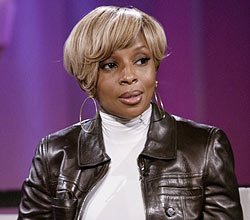
Everywhere I’ve gone in the city, I see black women doing their thing. Some of them—like the teachers at my son’s school or the police officer who gave me directions the other night—look like they’re doing OK. But most of them look like they’re struggling. They look overwhelmed with the various demands of life. The thing is though, they’re making it. They’re still here. And more than that, they’re still smiling.
There’s the women who made my po-boy at the Conoco on the corner of Franklin and Burmaster on the Westbank. The first thing I noticed about her was the way her short, perm-damaged hair was wound around her small, dark face. She’d died streaks of reddish-purple in it and capped it with an inexpensive-looking silver clasp. Whenever she spoke, I saw flashes of gold from her front teeth. Her movements were quick and efficient, but I could tell she was tired. Right after she handed me my sandwich, a teen-aged girl walked up to the counter and said something. The woman behind the counter said something in response. The girl turned to leave. On the way out of the door, I heard the girl say to someone else, “My Mama said ‘no.’” I spun around to get another look at the teenager in the doorway. Then I looked back at the young woman behind the counter and said, “You’re older than you look.” She smiled and said, “No, I’m not.” I looked back at her daughter again and realized what she meant. Babies having babies…you know the old story. “I hear you,” I told her. “Thanks for the sandwich.”
I remember this other woman I saw at the Walgreens on Holiday and General De Gaulle. I was buying some shaving cream for myself and a ruler for Jahi (my son). The woman was tall and heavy-set with a round, young-looking face. It was early on a Saturday morning, but she looked almost as tired as the young woman I’d seen the night before. (Most black women in New Orleans look tired. If I had the magic power to grant every woman in this city one thing, it’d be a nice quiet nap.) As she was ringing up my purchases, the woman saw Jahi drawing in his sketchbook. Her face lit up. “He drew all of that?” she asked me. I told her yes. “All by his self?” Yes, I said. “Boy, you’re an artist!” she told him. “You should draw me a picture and come back and give it to me.” She put our stuff in a bag and handed it to me. “That’s a good boy you got,” she said. I told her ‘thanks’ and we headed out.
Then just today I was at the Target on Manhattan, buying Jahi folders so he can get his school bag organized. As the woman behind the counter (who could’ve been the twin of the woman at the Walgreens) was ringing us up, I told Jahi that something he said wasn’t right. The woman abruptly stopped what she was doing. The look on her face was uncertain, as if she was stuck halfway between being surprised and getting pissed off. “What’s not right?” she asked me. “Oh, nothing,” I told her with a nod towards Jahi. “I wasn’t talking to you.” I saw her body relax. “OK,” she smiled. “I was about to say.” (That’s a New Orleans expression I haven’t heard in a while. ‘I was about to say.’ It sounds like there’s more coming, but that’s it. It means: ‘You almost pissed me off.’)
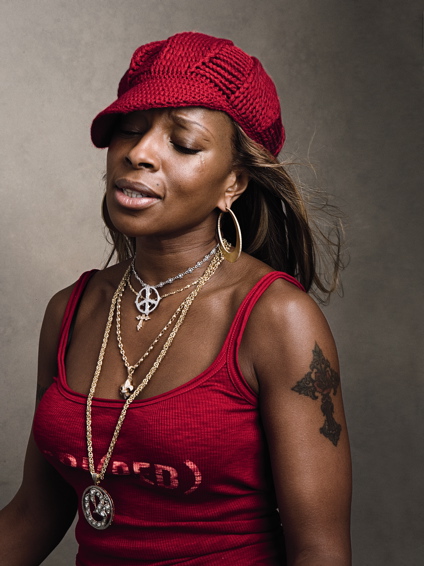
For me, what all three of these women have in common is not just that they’re here in New Orleans trying to make it. And it’s not just that they’re all working at subsistence-level jobs. Not just that they all probably have mouths at home to feed and no man to help them do so. It’s none of that stuff. The biggest thing I took from all three of these encounters and the thing I’m taking back with me to San Diego is that all three of these women are still smiling. They’ve been dealt a bum hand, but they’re not throwing in their cards. They’re at work, doing what they have to do, taking care of their responsibilities as well as they know how. They don’t have much, but they’re doing what they can with what they do have. In my opinion, that’s all any of us could ever ask of anyone. And if you think about it, it’s probably more than most of us do ourselves.
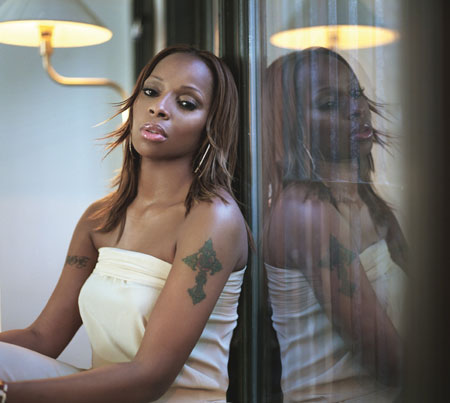
"With the My Life album, you know, I gotta really, really give it to Puff. He knew what I was, so he delivered tracks that were me. He studied me and brought things that he knew were going to make me just scream and act stupid.
"So when we first started, Puff bought me a track from Chucky [Thompson, producer] that everybody forgets about, 'Be With You.' And it was so crazy and grimy — heavy bass, big beats, big drums — that I began to write right there. I was so miserable, I began to write what I was dealing with right there. And each and every record from that point was based on me writing whatever I was dealing with, because that's what the music did: The music gave me a better misery. It was incredible how each and every song came with the undertone of misery.
" 'My Life' is based on love of the Roy Ayers song [the oft-sampled 'Everybody Loves the Sunshine']. The original is amazing, it always made me feel like I wanted to live and die like I didn't know which one I wanted to do — I would just spin out of control. So I began to write. I wrote that song with a girl by the name of Arlene DelValle, and we both were miserable writing that record together — and happy, too. We really, really wanted to be happy like we were miserable.
"I always thought I was the only person going through something — this is why I speak so freely and loudly about things now, because I had no idea there were so many people with me who were miserable like that. I found out by performing at shows and people coming up to me saying, 'Mary! This album, girl! I'm going through the same thing!' I was bugging out — people were having the exact same situations. Females in abusive relationships, men who were abusing their wives or their girlfriends, walking up to me going, 'Yo, you started some trouble in my house.' It's not me; it's the records. But the people made that record with me. That's my favorite album, by the way."
—Mary J. Blige
About the song:
“Work That” is a single from Mary J. Blige’s forthcoming eighth album, Growing Pains. By now, as most of you already know, Mary has become a ghetto legend. I’m long out of the music biz, so I don’t know for sure, but I doubt that Mary has much crossover appeal. My guess is she primarily sells records to young black women. And I know this for sure: no matter what the gender or race of her fan-base is, Mary’s songs are definitely written to young black women.
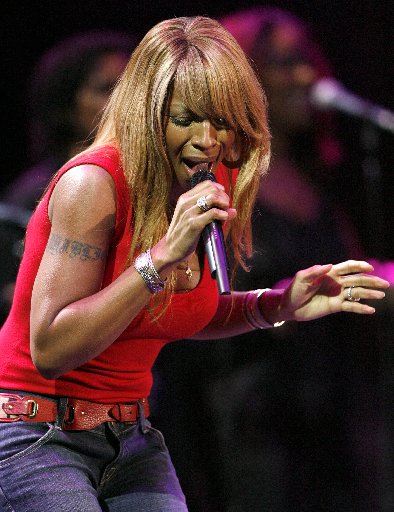
Check the lyrics of the first verse of "Work That":
There’s so many of you girlsThose lyrics could have been directed specifically at the three women I mention above. Mary identifies with them, sings for them and in many ways is them.
I hear you been running
From the beautiful queen
That you could be becoming…
Just because the length
Of your hair ain't long
And they often criticize you
For your skin tone
Hold your head high
Cause you're a pretty woman
Get your runway stride home
And keep it going
Girl, live your life!
It’s funny, Kalamu and I were talking about Mary J. Blige and he mentioned that he never really liked Mary as a singer. I agreed with him. My version of it is, I like Mary’s spirit more than I like her music. Kalamu said he wishes Mary would get a vocal coach and learn more about music. I disagree with that part. I think Mary is good just the way she is. Maybe her music just isn’t intended for me.
That tough, somewhat off-key sound that Mary has isn’t just because she grew up without the benefit of formal vocal training. It’s also because Mary is a raw, ghetto person who’s put a lot of time and energy into being herself. In the world she lives in—the glamour industry, the celebrity industry, the music industry—she’s undoubtedly considered ugly. She’s dark-skinned, nappy-headed and has the wide facial features of a sub-Saharan African. She has facial scars and imperfect elocution. But guess what? The young lady is beautiful. Not just physically beautiful, but emotionally beautiful as well. She lives and breathes exactly what she talks about in her song. Like Mary says in “Work That,” she’s not making up a bunch of pretty-sounding bullshit. She’s talking about things she knows.
As a bonus, I’m going to throw in a couple of songs from my favorite Mary J. Blige album, 1994’s My Life. The title track is a take-off on the Roy Ayers classic “Everybody Loves The Sunshine.” Even better is the album-closer “Be Happy.” Both songs have the positive spirit that I love so much in Mary’s music. It’s the spirit of someone who realizes that life doesn’t have to be easy to be enjoyable, that you have to smile sometimes even when you’re hurting, and that most of all, you can’t ever, ever give up.
To my Mom, my ex and all the other women of New Orleans: keep your heads up, stay beautiful and keep on smiling. You’re loved more than you know.
—Mtume ya Salaam
Black women strong
Well, yes. New Orleans has always been black women strong, the foundation of everything, even the most patriarchal of cultural manifestations such as the male-dominated Mardi Gras Indians, it be the sisters all back, around, behind and up under, the glue holding that stuff together. And it’s not just some mythical "queen behind the throne" shit. It’s straight up the women be sewing on the suits plus holding the family together and keeping the lights on, food on the table, and also be master psychologists bandaging wounded egos… I could go on, but the point is clear. I know this is the case not just in New Orleans, but also in anywhere-we-are in the USA.
Mary J. Blige is the music of these women. (Although the younger ones are currently into Keyshia Cole. Big time. I see Keyshia as another iteration of Mary J. Blige. More on that at another time.)
What we’re talking about is black working-class women singing for and about black working-class women. Those conditions, that reality, the particulars and daily predicaments.
Look at this picture of Mary J. when she was being hailed as the queen of “hip hop soul.”
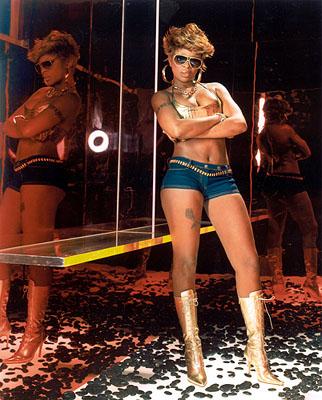
It’s not quite exactly my image of a queen. Moreover, I don’t think queens are appropriate for our future. That whole aristocracy stuff is bullshit on a real tip, over-compensation trying to pump up some racial self esteem that has been deflated by the hard ass day-to-day realities.
Mary J. has been going through changes since her early days over 15 years ago in the pop music industry. Indeed, fifteen years is a lifetime and a half for a pop artist. That Mary J. is still here is a miracle, but then that’s black women. Still here. A Miracle.
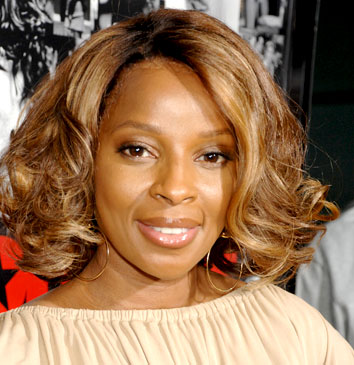
"Basically, The Breakthrough is Mary J. Blige not being what everybody else wanted her to be. You either like me or you don't: This is who I am and f--- if I've lost fans. I've made the choice to be happy — it's a choice that you make. This is the only place where I'm going to survive, and that's what The Breakthrough is about: making a choice to survive, to hell with everybody that has something negative to say.
"If I'm not sad, I'm not going to pretend to be sad to make a record. I'm going to go back to my experiences and grab something from the pain, or grab something that people never even heard about from me and put it on paper. But I'm not going to lie to my fans because my fans are not stupid and I do not look at them as stupid. I look at them as they're me, so I give them the real deal. And it's like, Mary's happy. Mary has problems too, but Mary chooses to be happy because Mary could also choose to be miserable. It's a bigger deal than just people — it's about what God thinks. He's given me all this, and I'm not going to spit in his face."
RATING: "I would give this album a 10 because I have broken through. I'm in a place where people can relate to me if they are ready. I know we did a great job. We put a lot of hard work and time into this."
—Mary J. Blige
Her 2005 album, The Breakthrough, set all kinds of records and had sales of over 5 million (including 3 million overseas—obviously her audience extends far beyond the women Mary directly addresses). In truth she has no current peer in terms of the longevity of her career in popular music. One can only hope that her accomplishments will serve as inspiration for others to produce honest music that specifically addresses the concerns and needs of the black working class. Although the specifics of our individual conditions are unique, the larger truth is that millions of people worldwide can relate to the systemic exploitation we suffer. There is certainly a racial aspect to our struggle but at its deepest level, our struggle is a human struggle.
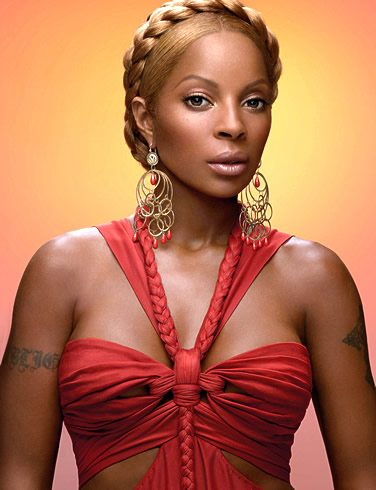
It’s not easy being a queen in the ghetto. Ten years or so of hard knocks ain’t no easy going down. It wears on you, wears you down, and generally, eventually wears you out. After a decade of dealing with the dragon, most find it impossible to keep up the youthful looks, maintain optimism in the eyes, and keep a real smile on the face.
Mary’s new music is about them changes—going through the changes and what going through the changes does to you. E.g. “Good Woman Down.” Mary J. calls it “my gift to you”—you being all her sisters.
Mtume mentioned I said something about wishing Mary would get some musical help. Actually, as Mtume correctly pointed out to me, she has gotten help. Her music has not only survived, it has also matured. Where she is today is a long ways away from where she was yesteryear.
I’m still not a number one fan but I’m a deep appreciator of who Mary J. is and what her music means.
Stylistically, what Mary J. has is a healthy blues moan up in her throat (actually it comes from bone deep). There’s a tone in her oooohhhs and aaaahhhhs that is as real as real comes (and goes). They can’t teach you to reach into yourself and dredge up the pain and express it through music. Of course, first the reality has to be experienced and then expressed. If you’re trying to look cute, you can’t sincerely sing about being broke down. Ain’t nothing cute about being broke down.
So like when Mary drops a psychological strip search song like “Baggage” or especially the brutally hard news of “Father In You,” well this is far, far beyond some shake your booty music. This is the kind of stuff you put on repeat in the middle of a lonely night or all morning long one holiday weekend when all your emotional ends are weak and it looks like the three days off is just an extra long period of agony.
Mary J. is singing for herself and herself is thousands of others going under in the trouble waters of growing up poor, black and female in modern America. Mary might not look like it but this is a tough battle against the uglies.
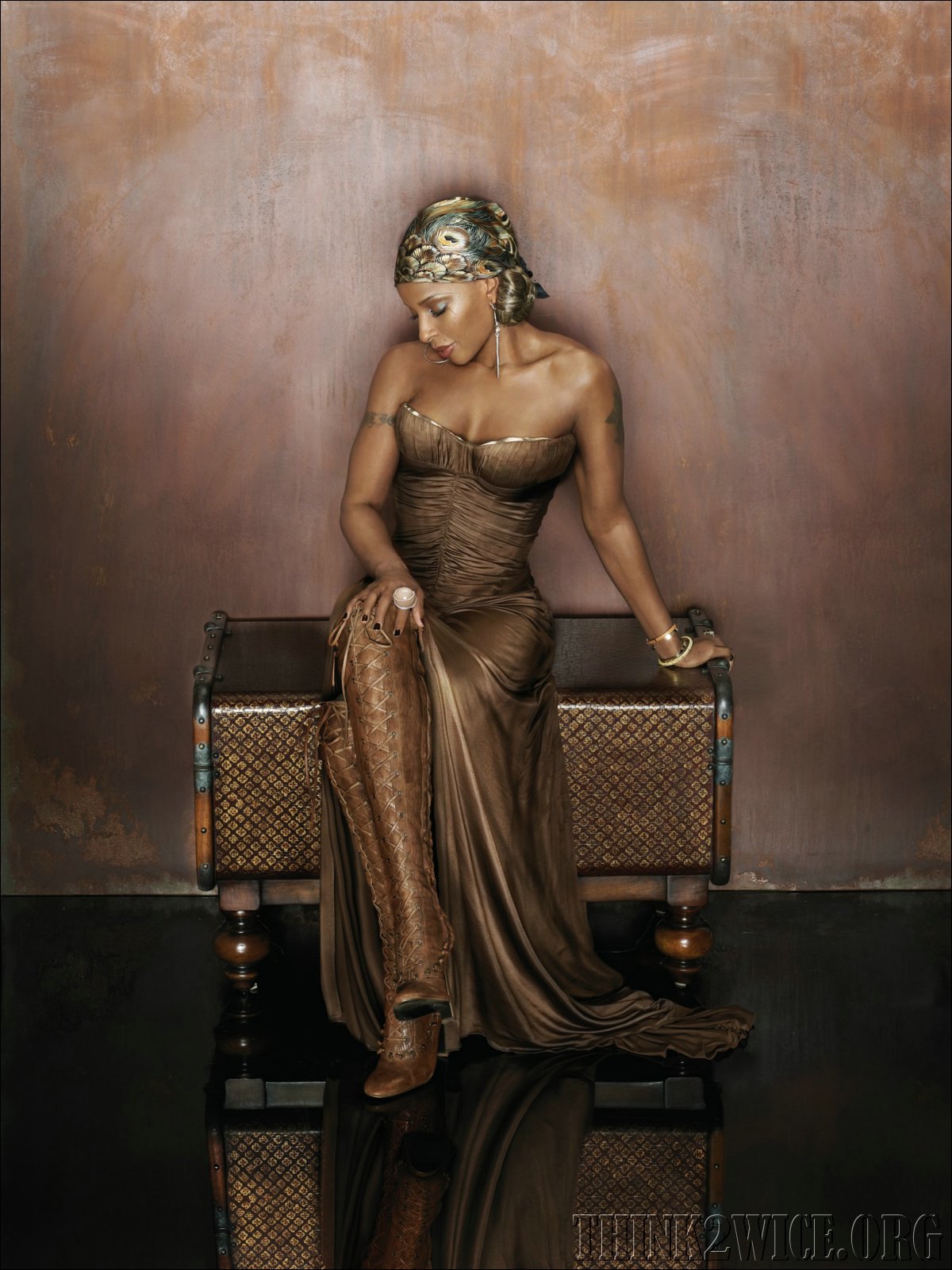
So, I’m lisening to (and not just looking at) these pictures of Mary J. and I know there’s a struggle going on. A deep struggle. She’s trying to look queenly, but she singing about some common ass shit.
I saw her at Essence Festival about six or seven years ago. In the parlance of the street, she looked like she was letting herself go. These recent portraits picture someone who is doing well, someone being pampered. But you know all the money in the world don’t mend broken hearts and busted egos. And so finally, it’s about this woman who’s struggling to be a queen but who is also keeping it real in terms of expressing the real deal on the streets.
I don’t know exactly how she does it but I know she’s doing it and I salute her. Salute her fortitude. Her beauty. Her honesty. Her forthrightness. Salute the fact that regardless of what stage her career is at, what stage comes up next, Mary J. stands firm in her black woman self, in relating directly to her sisters, mothers, aunts. The baby girls and sister ladies who literally populate our lives, keep us together, keeps our species going on.
Mary J. Bilge. All hail black women.
…AND RAISE BEAUTY TO
ANOTHER LEVEL OF SWEETNESS
You are a fresh flower
bursting boldly
into a hard world
with a softness
strong as steel
Reaching for sunlight
you raise yourself
up from down under
out of the degrading dirt
society has so routinely
dumped on women,
you have transformed
manure, muck and mire
into fertilizer
Spring self assertedly
past winter weather
you bring a sweet fragrant
incense and inspiration
into musty places
stale with the stuffiness
of misogynic sexist
status quos
You blossom, you bloom
you expand and grow
raising beauty
to a bedazzling higher
and healthier level of
light, life and love
Grow on Black rose
Black woman grow on!
We didn’t think about the connection between Mary J. and Nina Simone when we started writing for this week’s BoL but Mary J. Blige is set to portray Nina Simone in a forthcoming bio-film.
"The things we have in common is that we both move people, we're about truth, we stand up for what we believe in and we have morals at the end of the day.
“Her husband was managing her, and my husband manages me, and we're people that are not afraid to walk through the fire. Nina Simone was vocally incredible; she just gave you those goose bumps."
Stay tuned.
—Kalamu ya Salaam
This entry was posted on Monday, December 10th, 2007 at 1:12 am and is filed under Contemporary. You can follow any responses to this entry through the RSS 2.0 feed. You can leave a response, or trackback from your own site.
One Response to “MARY J. BLIGE / “Work That””
December 10th, 2007 at 1:49 pm
Nice post on the intersections of class, race, gender and music. Although there isn’t a lot of reliable research on race and Soundscan info, MJB’s recent massive critical and commercial success speaks to a good deal of crossover.
And also one contention: "She’s dark-skinned, nappy-headed and has the wide facial features of a sub-Saharan African. "
WOW. I have never heard MJB called dark skinned or big nosed and that description is not at all accurate per the pics you display not that there would be anything wrong with that. She’s medium brown skinned (not dark not light) with a medium sized prominently bridged noses (not wide not small). Few successful Black female entertainers have wide noses. Although skin color is always paramount wrt to success, the shape of the nose closely follows. Even the darker female stars have narrower noses or acquire them during the course of their careers.
Certainly she’s battled low self-image due to her inability to fit Black beauty standards derived from white dominance and oppression. In her VH1 Driven special and in an old Essence story she related her low self image to being self conscious about being weaved up and not light and having big feet and what her neighbors in Yonkers called her ‘donkey butt.’ It’s no wonder Black women are tired. While it’s great to champion those who smile through it, it would also be nice if more people expressed compassion and empathy in their dealings with tired Black women who can’t muster up enough energy to smile.
Mtume says
Everything is relative, jb. I made the comments I made about Mary strictly as a comparison to her counterparts in the glamour biz. Compared to the average black woman on the street, it’s like you said: Mary doesn’t look particularly dark, wide-featured or anything else we’d consider "African"-looking. But compare her to the other top black females in the various entertainment industries. Now you’re talking Beyonce, Alicia Keys, Halle Berry, etc. It’s almost a law that black women have to have Eurocentric features and light skin to make it big in America.
And just for the record, I personally think Mary is hot. I thought so back when she was the young and raw Queen of Hip-Hop Soul and still think so even now that she’s smoothed out a lot of the rough edges. Not that any of that is the point. I’m just saying….
As for the part about compassion and empathy for the women who are too tired to smile, I hear you loud and clear. I respect that too. It just touched me personally that a lot of the young ladies I’ve been running into back home still have enough positive energy to show a little happiness here and there even though they’re dealing with pressures so heavy that they’d crack me in half. But even if the sisters can’t or don’t smile, like you say, I can’t and don’t blame them one bit. It’s hard out there for a young black woman. For real.
Stay up, sisters!
Mtume.
Leave a Reply
| top |